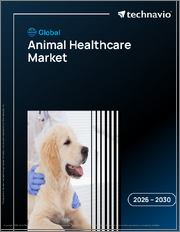
|
시장보고서
상품코드
1803869
동물용 소화기 건강보조제 시장 : 제품 유형, 제품 처방, 동물종, 용도, 유통 채널별 - 세계 예측(2025-2030년)Veterinary Digestive Health Supplements Market by Product Type, Product Formulation, Animal Type, Application, Distribution Channels - Global Forecast 2025-2030 |
||||||
동물용 소화기 건강보조제 시장은 2024년에 12억 7,000만 달러로 평가되었으며, 2025년에는 13억 4,000만 달러, CAGR 5.66%로 성장하여 2030년에는 17억 6,000만 달러에 달할 것으로 예측됩니다.
| 주요 시장 통계 | |
|---|---|
| 기준 연도 2024년 | 12억 7,000만 달러 |
| 추정 연도 2025년 | 13억 4,000만 달러 |
| 예측 연도 2030년 | 17억 6,000만 달러 |
| CAGR(%) | 5.66% |
동물용 소화기 건강보조제 시장의 성장을 촉진하는 새로운 트렌드와 혁신의 장을 마련합니다.
동물 의료에서 소화기 건강보조제에 대한 수요는 과학의 발전, 반려동물 사육 패러다임의 변화, 동물 복지에 대한 인식의 증가가 복잡하게 얽혀 매우 중요한 국면을 맞이하고 있습니다. 예방적 건강관리와 총체적 치료 접근법에 대한 관심이 높아지면서 수의사, 반려동물 보호자, 가축 관리자들은 효소 기능을 지원하고 장내 무결성을 유지하며 미생물 균형을 조절하는 보충제를 찾게 되었습니다. 이 소개에서는 연구 혁신, 규제 상황, 소비자 선호도 변화에 중점을 두면서 이 확대되는 시장을 형성하는 기본적인 촉진요인을 살펴봅니다.
과학적 혁신과 규제 진화가 동물용 소화기 건강보조제의 상황을 어떻게 재구성하고 있는지 알아봅니다.
동물용 소화기 건강보조제를 둘러싼 환경은 연구 집중도가 높아지고 이해관계자들의 기대치가 높아지면서 변화의 시기를 맞이하고 있습니다. 최첨단 마이크로바이옴 연구와 정밀 영양학의 융합은 예방과 치료의 양면에서 표적 보충제의 역할을 강화하고 있습니다. 반려동물 보호자들은 점점 더 정보에 밝아지고 있으며, 임상 데이터와 투명한 원재료 조달 방식으로 뒷받침되는 제품을 원하고 있습니다. 동시에, 가축 생산자들은 보다 엄격한 규제 프레임워크에 따라 지속가능하고 잔류물 없는 솔루션을 통해 동물의 건강을 최적화해야 한다는 압박에 직면해 있습니다.
동물용 소화기 보조제 공급망 전반에 걸친 전략적 재평가를 촉발하는 2025년 관세 동향 분석
2025년, 미국의 관세 갱신 시행은 동물용 소화기 건강보조제 분야의 조달 및 가격 전략에 다각적인 영향을 미치고 있습니다. 특수 효소, 프리바이오틱 섬유, 엄선된 프로바이오틱 균주 등 수입 원료에 의존하는 제조업체들은 투입 비용 상승에 직면하여 공급망 탄력성과 현지화 옵션을 재검토해야 하는 상황에 직면해 있습니다. 동시에 관세 조정으로 국내 생산자 간 경쟁 구도가 재조정되어 수입 의존도를 낮출 수 있는 수직계열화 사업이 유리한 환경이 조성되고 있습니다.
제품 유형별, 용도별, 유통 채널별 촉진요인 파악, 중요한 세분화 인사이트 제공
시장 세분화를 종합적으로 검토하면 제품 유형, 제형, 동물 종, 용도, 유통 채널에 걸쳐 미묘한 기회와 도전 과제를 파악할 수 있습니다. 제품 유형별로 평가하면 효소, 식이섬유 보충제, 허브 보충제, 프리바이오틱스, 프로바이오틱스, 프로바이오틱스 등 각기 다른 가치 제안과 전달 메커니즘을 가진 제품들이 시장에 출시되고 있습니다. 제품 제형 분야에서는 캡슐, 정제, 츄어블, 액상 현탁액, 분말 등 다양한 제형에 대응하여 다양한 투여 기호 및 투여 요건에 대응하고 있습니다.
동물용 소화기 보조제 세계 시장 상황을 형성하는 지역별 수요 패턴과 규제 차이에 대한 이해를 돕습니다.
동물용 소화기 건강보조제에 대한 지역별 수요의 차이는 다양한 시장 특성과 전략적 우선순위를 뒷받침합니다. 아메리카에서는 강력한 반려동물 사육 문화와 선진적인 수의학 인프라가 주류에 대한 견고한 도입에 힘을 실어주고 있습니다. 미국과 캐나다의 규제 프레임워크는 성분의 투명성과 임상적 입증에 중점을 두어 고급 제제에 적합한 환경을 조성하고 있습니다. 동시에 중남미 시장은 신흥 중산층 소비자들 사이에서 동물복지와 예방의학에 대한 인식이 높아지면서 점차 확대되고 있습니다.
업계 선도 기업들이 혁신 파트너십과 공급망 통합을 통해 경쟁 우위를 확보하는 방법을 프로파일링합니다.
동물용 소화기 보조제의 주요 기업들은 연구개발, 전략적 제휴, 통합 공급망 역량에 대한 노력으로 두드러진 존재감을 드러내고 있습니다. 주요 기업들은 독자적인 프로바이오틱스 균주, 효소 안정화 기술, 식물 추출 공정 등에 많은 투자를 통해 제품 차별화를 꾀하고 있습니다. 이들 기업들은 동물실험이나 논문 심사를 통해 제품의 효능을 검증하기 위해 학계나 위탁연구기관과 협력하는 경우가 많습니다.
동물용 소화기 건강보조제 분야의 새로운 기회를 활용하기 위한 공동 연구 및 유연한 공급망 전략 실행
빠르게 진화하는 동물용 소화기 건강보조제 시장에서 살아남기 위해 업계 리더들은 혁신, 협업, 운영 우수성을 연계한 미래지향적인 전략적 프레임워크를 채택해야 합니다. 우선 수의과대학 및 마이크로바이옴 연구센터와의 연구 협력에 우선적으로 투자함으로써 임상적으로 검증된 제제를 얻을 수 있고, 브랜드의 신뢰도를 높일 수 있습니다. 이러한 협력적 접근 방식은 새로운 생리활성 화합물이나 독자적인 균주에 대한 독점적 접근을 보장하기 위해 성분 공급업체와의 공동 개발 계약으로 확대되어야 합니다.
종합적인 시장 인사이트와 전략적 제안을 뒷받침하는 1차 및 2차 조사 통합 프레임워크에 대해 자세히 알아보기
이 조사 방법은 정성적 접근과 정량적 접근을 통합하여 종합적인 시장 이해를 제공하기 위한 것입니다. 1차 조사에서는 수의영양학자, 제제 과학자, 유통 임원 등 주요 오피니언 리더들과 체계적인 면담과 협의를 진행했습니다. 이러한 인사이트를 통해 제품의 효과, 시장 촉진요인, 채택 장벽에 대한 현실적인 관점을 얻을 수 있었습니다. 이와 병행하여 2차 조사에서는 공개된 과학 문헌, 규제 관련 문서, 업계 백서 등을 체계적으로 검토하여 1차 조사 결과를 뒷받침하는 2차 조사를 진행했습니다.
동물용 소화기 보조제 분야에서 지속가능한 리더십을 위한 전략적 핵심 과제를 파악하기 위한 주요 연구 결과 통합
요약하면, 동물용 소화기 건강보조제 시장은 과학적 혁신, 진화하는 규제 프레임워크, 역동적인 소비자 기대치를 특징으로 하는 중요한 변곡점에 서 있습니다. 표적화된 마이크로바이옴 연구, 첨단 제형 기술, 전략적 공급망 재편이 결합되어 반려동물, 이국적인 동물, 가축 부문의 가치 제안이 재정의되고 있습니다. 관세 중심의 비용 압박은 현지 조달 이니셔티브와 성분 혁신의 촉매제가 되어 민첩한 운영 모델의 필요성을 강조하고 있습니다.
목차
제1장 서문
제2장 조사 방법
제3장 주요 요약
제4장 시장 개요
제5장 시장 역학
제6장 시장 인사이트
- Porter's Five Forces 분석
- PESTEL 분석
제7장 미국 관세의 누적 영향 2025
제8장 동물용 소화기 건강보조제 시장 : 제품 유형별
- 효소
- 식이섬유 보충제
- 허브 보충제
- 프리바이오틱스
- 프로바이오틱스
제9장 동물용 소화기 건강보조제 시장 : 제품 배합별
- 캡슐과 정제
- 츄어블
- 액체
- 분말
제10장 동물용 소화기 건강보조제 시장 : 동물 유형별
- 반려동물
- 고양이
- 개
- 외래종/펫
- 가축
- 소
- 가금
- 양/염소
- 돼지
제11장 동물용 소화기 건강보조제 시장 : 용도별
- 해독
- 장 건강
- 면역 서포트
- 소화 개선
- 염증 제어
제12장 동물용 소화기 건강보조제 시장 : 유통 채널별
- 오프라인
- 온라인
제13장 아메리카의 동물용 소화기 건강보조제 시장
- 미국
- 캐나다
- 멕시코
- 브라질
- 아르헨티나
제14장 유럽, 중동 및 아프리카의 동물용 소화기 건강보조제 시장
- 영국
- 독일
- 프랑스
- 러시아
- 이탈리아
- 스페인
- 아랍에미리트
- 사우디아라비아
- 남아프리카공화국
- 덴마크
- 네덜란드
- 카타르
- 핀란드
- 스웨덴
- 나이지리아
- 이집트
- 튀르키예
- 이스라엘
- 노르웨이
- 폴란드
- 스위스
제15장 아시아태평양의 동물용 소화기 건강보조제 시장
- 중국
- 인도
- 일본
- 호주
- 한국
- 인도네시아
- 태국
- 필리핀
- 말레이시아
- 싱가포르
- 베트남
- 대만
제16장 경쟁 구도
- 시장 점유율 분석, 2024
- FPNV 포지셔닝 매트릭스, 2024
- 경쟁 분석
- Adisseo S.A.
- BASF SE
- Bioiberica S.A.
- BIOMIN Holding GmbH
- Boehringer Ingelheim GmbH
- Dechra Pharmaceuticals PLC
- Elanco Animal Health Incorporated
- Evonik Industries AG
- Hill's Pet Nutrition, Inc.
- Kemin Industries, Inc.
- Merck & Co., Inc.
- Nutramax Laboratories, Inc.
- Pet Naturals of Vermont, Inc.
- Phibro Animal Health Corporation
- Protexin Animal Health Ltd.
- Royal DSM N.V.
- Vetoquinol S.A.
- VetriScience Laboratories, Inc.
- Virbac S.A.
- Zoetis Inc.
제17장 리서치 AI
제18장 리서치 통계
제19장 리서치 컨택트
제20장 리서치 기사
제21장 부록
KSM 25.09.10The Veterinary Digestive Health Supplements Market was valued at USD 1.27 billion in 2024 and is projected to grow to USD 1.34 billion in 2025, with a CAGR of 5.66%, reaching USD 1.76 billion by 2030.
| KEY MARKET STATISTICS | |
|---|---|
| Base Year [2024] | USD 1.27 billion |
| Estimated Year [2025] | USD 1.34 billion |
| Forecast Year [2030] | USD 1.76 billion |
| CAGR (%) | 5.66% |
Setting the Stage for Emerging Trends and Innovations That Are Catalyzing Growth in Veterinary Digestive Health Supplements Market
The demand for digestive health supplements in veterinary care has reached a pivotal juncture, driven by an intricate interplay of scientific advances, changing pet ownership paradigms, and heightened awareness of animal welfare. Growing interest in preventive healthcare and holistic treatment approaches has propelled veterinarians, pet owners, and livestock managers to explore supplements that support enzyme function, maintain gut integrity, and modulate microbial balance. This introduction examines the foundational drivers shaping this expanding market, placing emphasis on research breakthroughs, regulatory landscapes, and shifting consumer preferences.
Scientific innovation is forging new pathways to enhanced digestive well-being, with developments in bioactive compounds, formulation technologies, and targeted delivery systems. Meanwhile, trends in pet companionship and livestock productivity underscore the urgent need for reliable digestive supplements that deliver measurable health benefits. The synergy between nutritional science and veterinary medicine has catalyzed a dynamic ecosystem, in which product developers, distribution partners, and end-users collaborate to set rigorous standards for efficacy and safety.
In this context, the introductory analysis establishes the core themes and critical success factors that underpin market momentum. It underscores the importance of evidence-based formulations, strategic product positioning, and robust stakeholder engagement. By framing the market's current landscape through the lens of innovation, consumer expectations, and scientific validation, this opening section sets the stage for a deeper exploration of the transformative shifts, segmentation nuances, and strategic imperatives presented in the subsequent chapters.
Exploring How Scientific Breakthroughs and Evolving Regulations Are Reshaping the Veterinary Digestive Health Supplements Landscape
The veterinary digestive health supplements environment is undergoing transformative shifts driven by heightened research focus and evolving stakeholder expectations. The convergence of cutting-edge microbiome studies and precision nutrition has elevated the role of targeted supplements in both preventive and therapeutic contexts. Pet owners are increasingly informed, seeking products backed by clinical data and transparent ingredient sourcing practices. At the same time, livestock producers face mounting pressure to optimize animal health through sustainable, residue-free solutions that align with stricter regulatory frameworks.
Technological advancements in encapsulation, slow-release matrices, and novel probiotic strains are reshaping formulation strategies. These innovations not only improve bioavailability and palatability but also enable tailored solutions for different species, life stages, and health conditions. Moreover, digital platforms and telehealth services are enhancing access to veterinary guidance, making supplement recommendations more personalized and data-driven. This shift toward integrated care models amplifies the demand for supplements that can demonstrate consistent performance in real-world settings.
The interplay between consumer education, scientific validation, and regulatory harmonization is creating new opportunities for collaboration across the value chain. As academic institutions, industry players, and regulatory authorities engage in joint initiatives, the landscape is evolving toward standardized efficacy benchmarks and streamlined approval pathways. These collective efforts are poised to redefine best practices, strengthen market credibility, and accelerate adoption of next-generation digestive health supplements across companion, exotic, and livestock animal sectors.
Analyzing the 2025 Tariff Dynamics That Have Prompted Strategic Reevaluations Across the Veterinary Digestive Health Supplements Supply Chain
In 2025, the implementation of updated United States tariffs has exerted multifaceted effects on the sourcing and pricing strategies within the veterinary digestive health supplements sector. Manufacturers reliant on imported raw ingredients such as specialized enzymes, prebiotic fibers, and select probiotic strains have encountered elevated input costs, compelling them to reassess supply chain resilience and localization options. At the same time, tariff adjustments have recalibrated competitive dynamics among domestic producers, fostering an environment that rewards vertically integrated operations capable of mitigating import dependencies.
This fiscal landscape has prompted product developers to intensify efforts in alternative sourcing and ingredient innovation. Companies have accelerated research into bioengineered microbial cultures and locally cultivated botanical extracts to reduce exposure to international trade volatility. Concurrently, distribution partners have refined inventory management and pricing models to absorb cost fluctuations without diminishing market accessibility. The tariff impact analysis reveals a trend toward strategic partnerships among ingredient suppliers, contract manufacturers, and end-users to share the burden of cost escalation and preserve product affordability.
These shifts underscore the critical importance of agile supply chain frameworks and diversified procurement strategies. Organizations that proactively adapt to tariff-driven changes by investing in domestic capacity expansion and cross-border collaboration will be best positioned to sustain growth. The cumulative effect of the 2025 tariff landscape thus serves as a catalyst for heightened innovation, supply chain redefinition, and strategic differentiation in the competitive arena of veterinary digestive health supplements.
Unearthing Critical Segmentation Insights That Illuminate Distinctive Growth Drivers Across Product Types Applications and Distribution Channels
A comprehensive examination of market segmentation reveals nuanced opportunities and challenges across product type, formulation, animal type, application, and distribution channels. When evaluating by product type, the market encompasses enzymes, fiber supplements, herbal supplements, prebiotics and probiotics, each offering distinct value propositions and delivery mechanisms. In the realm of product formulation, capsules and tablets, chewable formats, liquid suspensions and powders cater to diverse administration preferences and dosage requirements.
Segmenting by animal type uncovers differentiated demand dynamics in companion animals, exotic and specialty species, and livestock populations. Companion animals such as cats and dogs present specific viability considerations related to palatability and owner compliance. Exotic or pet species require precision formulations that address unique digestive physiologies. Livestock categories-cattle, poultry, sheep and goats, swine-demand scalable solutions that balance cost efficiency with measurable health outcomes.
Within the application spectrum, segments such as detoxification, gut health maintenance, immune support, digestion improvement and inflammation control highlight the therapeutic breadth of digestive supplements. Each application niche engenders tailored formulation requirements and distinct efficacy criteria. Examining distribution channels reveals an ongoing shift, as traditional offline retail and veterinary clinics coexist with expanding online platforms, unlocking new avenues for consumer education and direct-to-consumer engagement. This segmentation insight underscores the imperative for product innovators and marketers to adopt a multi-dimensional approach that resonates with targeted end-users and optimizes channel-specific strategies.
Understanding How Regional Demand Patterns and Regulatory Variances Are Shaping the Global Veterinary Digestive Health Supplements Market Landscape
Regional variations in demand for veterinary digestive health supplements underscore diverse market characteristics and strategic priorities. In the Americas, strong pet ownership culture and advanced veterinary infrastructure drive robust mainstream adoption. Regulatory frameworks in the United States and Canada emphasize ingredient transparency and clinical substantiation, fostering an environment conducive to premium formulations. Concurrently, Latin American markets are experiencing gradual expansion as awareness of animal welfare and preventive care intensifies among emerging middle-class consumers.
Across Europe, the Middle East and Africa, heterogeneous regulatory landscapes and cultural preferences shape market evolution. Western European countries maintain stringent quality standards and robust retailer networks, while Eastern Europe presents opportunistic growth for cost-effective formulations. In the Middle East and Northern Africa, increasing investment in veterinary services and agribusiness modernization supports demand for livestock-oriented digestive solutions. Sub-Saharan Africa, though nascent, offers long-term potential tied to livestock productivity improvements and public health initiatives.
The Asia-Pacific region exhibits dynamic growth trajectories fueled by expanding pet adoption in urban centers and large-scale livestock rearing in agricultural powerhouses. Japan and Australia prioritize high-value, scientifically advanced products, whereas Southeast Asian markets emphasize affordability and accessibility. China and India, characterized by vast livestock operations and a rising pet industry, present dual opportunities for innovative formulations and volume-driven strategies. These regional insights equip stakeholders with a granular understanding of localized drivers, regulatory nuances and channel preferences essential for geographical market expansion.
Profiling How Leading Industry Players Are Leveraging Innovation Partnerships and Supply Chain Integration to Gain Competitive Advantage
Leading companies within the veterinary digestive health supplements arena are distinguished by their commitment to research and development, strategic alliances and integrated supply chain capabilities. Key players have invested heavily in proprietary probiotic strains, enzyme stabilization technologies and botanical extraction processes to differentiate their offerings. These firms often collaborate with academic institutions and contract research organizations to validate product efficacy through controlled animal trials and peer-reviewed publications.
Strategic partnerships between ingredient suppliers and manufacturing specialists have emerged as a prevalent model for accelerating product innovation while optimizing production costs. Top-tier manufacturers leverage modular production facilities that allow rapid scale-up of high-demand formulations, ensuring swift market entry. Meanwhile, companies with established veterinary distribution networks capitalize on omnichannel strategies, combining direct veterinary channels, specialty pet retailers and e-commerce platforms to maximize reach.
The competitive landscape also features niche innovators focusing on exotic species or tailored digestive therapies, filling specific market gaps. This diversification strategy underscores the importance of agility and deep domain expertise. Companies that integrate real-time analytics for inventory and demand forecasting gain an operational edge, aligning product portfolios with regional consumption patterns and emerging health trends. These collective insights highlight the strategic imperatives and best practices driving leadership and differentiation in this rapidly evolving market.
Implementing Collaborative Research and Agile Supply Chain Strategies to Capitalize on Emerging Opportunities in Veterinary Digestive Health Supplements
To navigate the rapidly evolving veterinary digestive health supplements market, industry leaders must adopt a forward-looking strategic framework that aligns innovation, collaboration and operational excellence. First, prioritizing investment in research collaborations with veterinary schools and microbiome research centers will yield clinically validated formulations and strengthen brand credibility. This collaborative approach should extend to co-development agreements with ingredient suppliers to secure exclusive access to novel bioactive compounds and proprietary strains.
Second, companies should refine supply chain architectures by integrating localized production hubs and dynamic procurement systems. Developing regional manufacturing capabilities reduces exposure to trade uncertainties and accelerates time to market. Implementing advanced analytics for demand sensing and inventory optimization will enhance responsiveness to shifting consumption patterns across companion, exotic and livestock segments.
Third, a dual distribution strategy combining targeted veterinary partnerships with expanded direct-to-consumer digital platforms is critical. Tailored educational content for veterinarians and pet owners will drive informed adoption, while seamless e-commerce experiences ensure product accessibility. Lastly, embedding sustainability metrics-such as carbon footprint reduction in manufacturing and recyclable packaging solutions-will resonate with environmentally conscious stakeholders. By executing these actionable recommendations, industry leaders can secure competitive differentiation and unlock new avenues for growth.
Detailing the Integrated Primary and Secondary Research Framework That Underpins Comprehensive Market Insights and Strategic Recommendations
This research methodology synthesizes qualitative and quantitative approaches to deliver a comprehensive market understanding. Primary research involved structured interviews and consultations with key opinion leaders, including veterinary nutritionists, formulation scientists and distribution executives. These insights provided real-world perspectives on product efficacy, market drivers and adoption barriers. In parallel, secondary research encompassed a systematic review of publicly available scientific literature, regulatory documents and industry white papers to corroborate primary findings.
Data triangulation was achieved by cross-validating quantitative shipment and sales data from proprietary commercial sources with qualitative inputs from industry stakeholders. This dual-track approach ensured robustness in identifying market dynamics and segmentation trends. Segmentation analyses were meticulously performed across product type, formulation, animal type, application and distribution channels to uncover growth pockets and strategic imperatives.
Regional market assessments were informed by regulatory reviews and localized consumption patterns, while competitive intelligence was derived through patent landscape evaluations, academic collaborations and reported partnership announcements. The methodology emphasizes transparency and reproducibility, providing decision-makers with confidence in the validity of insights and strategic recommendations.
Synthesizing Key Findings to Illuminate Strategic Imperatives for Sustained Leadership in Veterinary Digestive Health Supplements
In summary, the veterinary digestive health supplements market stands at a critical inflection point, characterized by scientific innovation, evolving regulatory frameworks and dynamic consumer expectations. The convergence of targeted microbiome research, advanced formulation technologies and strategic supply chain realignments is redefining the value proposition across companion, exotic and livestock segments. Tariff-driven cost pressures have catalyzed local sourcing initiatives and ingredient innovation, underscoring the necessity of agile operational models.
Segmentation insights reveal that tailored approaches-spanning product type, formulation format, animal species, therapeutic application and distribution channel-drive differentiation and market penetration. Regional nuances highlight the importance of localized regulatory compliance, cultural preferences and distribution infrastructure. Leading companies are securing competitive advantage through research partnerships, integrated manufacturing footprints and omnichannel distribution strategies.
The actionable recommendations stress collaborative R&D investment, supply chain optimization, balanced distribution tactics and sustainability commitments as cornerstones for sustained growth. By embracing these strategic imperatives, stakeholders can navigate market complexities, address unmet needs and capitalize on emerging opportunities. This executive summary delivers a cohesive perspective, equipping decision-makers with the insights necessary to chart a path toward long-term success.
Table of Contents
1. Preface
- 1.1. Objectives of the Study
- 1.2. Market Segmentation & Coverage
- 1.3. Years Considered for the Study
- 1.4. Currency & Pricing
- 1.5. Language
- 1.6. Stakeholders
2. Research Methodology
- 2.1. Define: Research Objective
- 2.2. Determine: Research Design
- 2.3. Prepare: Research Instrument
- 2.4. Collect: Data Source
- 2.5. Analyze: Data Interpretation
- 2.6. Formulate: Data Verification
- 2.7. Publish: Research Report
- 2.8. Repeat: Report Update
3. Executive Summary
4. Market Overview
- 4.1. Introduction
- 4.2. Market Sizing & Forecasting
5. Market Dynamics
- 5.1. Rising adoption of canine and feline personalized microbiome sequencing services to tailor supplement formulations
- 5.2. Integration of multi-strain canine probiotic chews combined with postbiotics to enhance gut barrier function
- 5.3. Growing demand for plant-based and natural prebiotic fiber blends in pet digestive health products
- 5.4. Expansion of subscription-based models offering customized monthly digestive supplement deliveries for pets
- 5.5. Increasing use of innovative encapsulation technologies for targeted release of digestive enzymes in animals
- 5.6. Surge in formulations combining herbal extracts like aloe vera and slippery elm for soothing pet gastrointestinal discomfort
- 5.7. Emphasis on veterinarian-backed synbiotic supplements backed by clinical research to support animal gut wellness
6. Market Insights
- 6.1. Porter's Five Forces Analysis
- 6.2. PESTLE Analysis
7. Cumulative Impact of United States Tariffs 2025
8. Veterinary Digestive Health Supplements Market, by Product Type
- 8.1. Introduction
- 8.2. Enzymes
- 8.3. Fiber Supplements
- 8.4. Herbal Supplements
- 8.5. Prebiotics
- 8.6. Probiotics
9. Veterinary Digestive Health Supplements Market, by Product Formulation
- 9.1. Introduction
- 9.2. Capsules & Tablets
- 9.3. Chewable
- 9.4. Liquid
- 9.5. Powder
10. Veterinary Digestive Health Supplements Market, by Animal Type
- 10.1. Introduction
- 10.2. Companion Animals
- 10.2.1. Cats
- 10.2.2. Dogs
- 10.3. Exotic/Pet Species
- 10.4. Livestock
- 10.4.1. Cattle
- 10.4.2. Poultry
- 10.4.3. Sheep/Goats
- 10.4.4. Swine
11. Veterinary Digestive Health Supplements Market, by Application
- 11.1. Introduction
- 11.2. Detoxification
- 11.3. Gut Health
- 11.4. Immune Support
- 11.5. Improving Digestion
- 11.6. Inflammation Control
12. Veterinary Digestive Health Supplements Market, by Distribution Channels
- 12.1. Introduction
- 12.2. Offline
- 12.3. Online
13. Americas Veterinary Digestive Health Supplements Market
- 13.1. Introduction
- 13.2. United States
- 13.3. Canada
- 13.4. Mexico
- 13.5. Brazil
- 13.6. Argentina
14. Europe, Middle East & Africa Veterinary Digestive Health Supplements Market
- 14.1. Introduction
- 14.2. United Kingdom
- 14.3. Germany
- 14.4. France
- 14.5. Russia
- 14.6. Italy
- 14.7. Spain
- 14.8. United Arab Emirates
- 14.9. Saudi Arabia
- 14.10. South Africa
- 14.11. Denmark
- 14.12. Netherlands
- 14.13. Qatar
- 14.14. Finland
- 14.15. Sweden
- 14.16. Nigeria
- 14.17. Egypt
- 14.18. Turkey
- 14.19. Israel
- 14.20. Norway
- 14.21. Poland
- 14.22. Switzerland
15. Asia-Pacific Veterinary Digestive Health Supplements Market
- 15.1. Introduction
- 15.2. China
- 15.3. India
- 15.4. Japan
- 15.5. Australia
- 15.6. South Korea
- 15.7. Indonesia
- 15.8. Thailand
- 15.9. Philippines
- 15.10. Malaysia
- 15.11. Singapore
- 15.12. Vietnam
- 15.13. Taiwan
16. Competitive Landscape
- 16.1. Market Share Analysis, 2024
- 16.2. FPNV Positioning Matrix, 2024
- 16.3. Competitive Analysis
- 16.3.1. Adisseo S.A.
- 16.3.2. BASF SE
- 16.3.3. Bioiberica S.A.
- 16.3.4. BIOMIN Holding GmbH
- 16.3.5. Boehringer Ingelheim GmbH
- 16.3.6. Dechra Pharmaceuticals PLC
- 16.3.7. Elanco Animal Health Incorporated
- 16.3.8. Evonik Industries AG
- 16.3.9. Hill's Pet Nutrition, Inc.
- 16.3.10. Kemin Industries, Inc.
- 16.3.11. Merck & Co., Inc.
- 16.3.12. Nutramax Laboratories, Inc.
- 16.3.13. Pet Naturals of Vermont, Inc.
- 16.3.14. Phibro Animal Health Corporation
- 16.3.15. Protexin Animal Health Ltd.
- 16.3.16. Royal DSM N.V.
- 16.3.17. Vetoquinol S.A.
- 16.3.18. VetriScience Laboratories, Inc.
- 16.3.19. Virbac S.A.
- 16.3.20. Zoetis Inc.



















